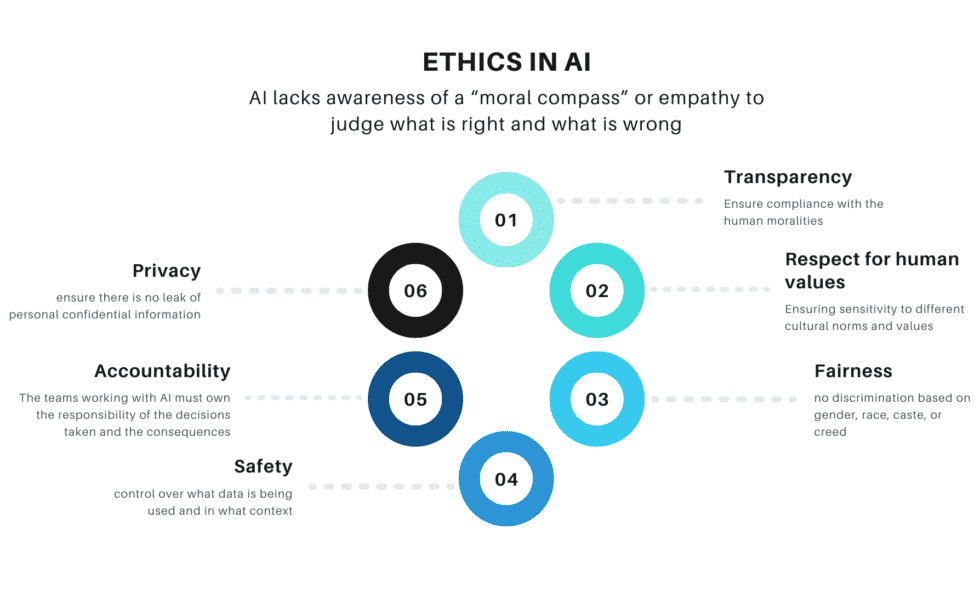Role of Ethics in Artificial Intelligence.
Ethics is an essential component in the development and utilization of Artificial Intelligence (AI). AI has the power to profoundly influence many aspects of human life and decisions, and so it is of the utmost importance to ensure that its development and use is guided by ethical principles. Without ethics, AI technology could be misused in ways that are detrimental to humans, society, and the environment.
At its core, AI is a set of algorithms and technologies that are used to identify patterns, develop predictive models, and make decisions. Because AI is capable of executing decisions autonomously, it is essential to ensure that it does so with a high level of ethical considerations. The principles that guide the development and utilization of AI include fairness, safety, security, privacy, trust, and accountability.
Fairness ensures that AI is used equitably and that it does not inadvertently discriminate against any particular group or individual. Safety and security considerations ensure that AI is used responsibly and without endangering the safety of individuals or groups. Privacy is essential to ensure that personal information is protected and used in ways that are consistent with the rights of individuals. Trust requires that AI is designed with transparency, so that users understand how decisions are being made. Finally, accountability requires that AI-based decisions are traceable, auditable, and verifiable.
Ethics plays a crucial role in the development and utilization of AI. It is important that principles guide the development of AI so that its use is responsible, equitable, and secure. By ensuring that AI is developed with ethical considerations in mind, it can be used to bring positive change and improvements in the lives of humans, society, and the environment.

One of the pros of ethical AI is that it allows for AI-driven decision making to be more transparent. AI has been found to be more effective at decision making than humans in many cases, but it can also be difficult to explain how AI arrives at decisions. To combat this, ethical AI systems can be designed to track and explain their decisions, allowing for greater accountability and better decision-making. Additionally, ethical AI can help to prevent potential bias in decision making, as AI algorithms are less likely to rely on subjective criteria or predetermined biases.
Another pro of ethical AI is that it can help to reduce the risk of unintended consequences and moral issues arising from the use of AI. AI systems can be designed to identify and prevent potentially dangerous or unethical actions, as well as identify and alert users to any potential problems. This helps to ensure that AI-driven decisions are ethical and safe.
However, there are also potential drawbacks to not build ethics into AI. One of the primary drawbacks is the potential for AI to be used for nefarious purposes. For example, AI could potentially be used to manipulate or exploit individuals and society in general. Additionally, ethical AI systems can be difficult and expensive to develop and maintain, which could create a barrier to their widespread adoption.
Principles of AI have the potential to provide many benefits, including increased transparency and accountability, as well as improved decision making and reduced bias. However, it is important to consider the potential risks associated with AI, such as the potential for misuse or exploitation. Ultimately, it is important to carefully consider the pros and cons of ethics in AI before implementing any AI-driven systems.
The implementation of principles in the development of Artificial Intelligence (AI) is essential for a successful future. AI is increasingly being adopted into multiple aspects of modern life and its use is expected to expand rapidly. With the implications and potential applications of AI being so far-reaching, it is important that ethical considerations are integrated into the design and use of these systems.
The use of ethical considerations in AI design helps to ensure that the systems are safe and secure, and operate in a responsible and accountable manner. By taking into account ethical considerations, the developers can design systems that are both transparent and fair, allowing users to trust and rely on the AI systems. AI systems that have been developed with ethical considerations in mind are more likely to have greater accuracy, reliability, and fairness.
The integration of ethical considerations into AI development allows the systems to better understand and respond to the human context, taking into account user needs and preferences, helps to ensure that AI systems are safe, secure, and fair. By understanding and incorporating the human context, the AI system is better able to provide customized services, solutions, improved accuracy and reliability. This can help to improve user experience and satisfaction, as the AI is better able to meet the needs and expectations of the users. Lastly, ethical considerations help to protect the systems and user data from malicious actors. All of these factors make the integration of ethical considerations into AI development an essential part of the process.
The development of Artificial Intelligence (AI) technologies has raised numerous ethical concerns for both developers and users. While the potential of AI to increase efficiency and improve decision-making is undeniable, it can also be abused in ways that are harmful to both individuals and society as a whole. There are several drawbacks of not implementing ethics into AI that should be taken into consideration.
One of the most significant drawbacks is that ethical AI systems can be expensive and difficult to implement. This is because they often require additional development, testing, and maintenance, as well as ongoing monitoring of their outputs. Furthermore, the cost of implementation and the complexity of the system make it difficult for some businesses to access and use ethical AI systems.
In addition, ethical AI systems may fail to identify and prevent certain unethical behaviors. For example, some AI systems are designed to detect and prevent fraud, but they may fail to detect more subtle or devious actions. Similarly, AI systems that are designed to identify bias may not be able to detect subtle differences between users, which can lead to bias in the system’s outputs.
Finally, ethical AI systems can be seen as a form of control over individuals, which can lead to privacy concerns. For instance, some ethical AI systems may require users to provide personal data in order to be used, which can be used to create profiles and make predictions about the user’s behavior. This data can also be used by third parties for their own purposes, which raises concerns about the misuse of data.
Overall, there are several drawbacks of ethics in AI, which include the expense and complexity of implementation, potential failure to detect unethical behavior, and potential misuse of user data. Despite these drawbacks, ethical AI systems can still be a powerful tool to increase efficiency and improve decision-making, and developers should take these drawbacks into account when developing and implementing ethical AI systems.

